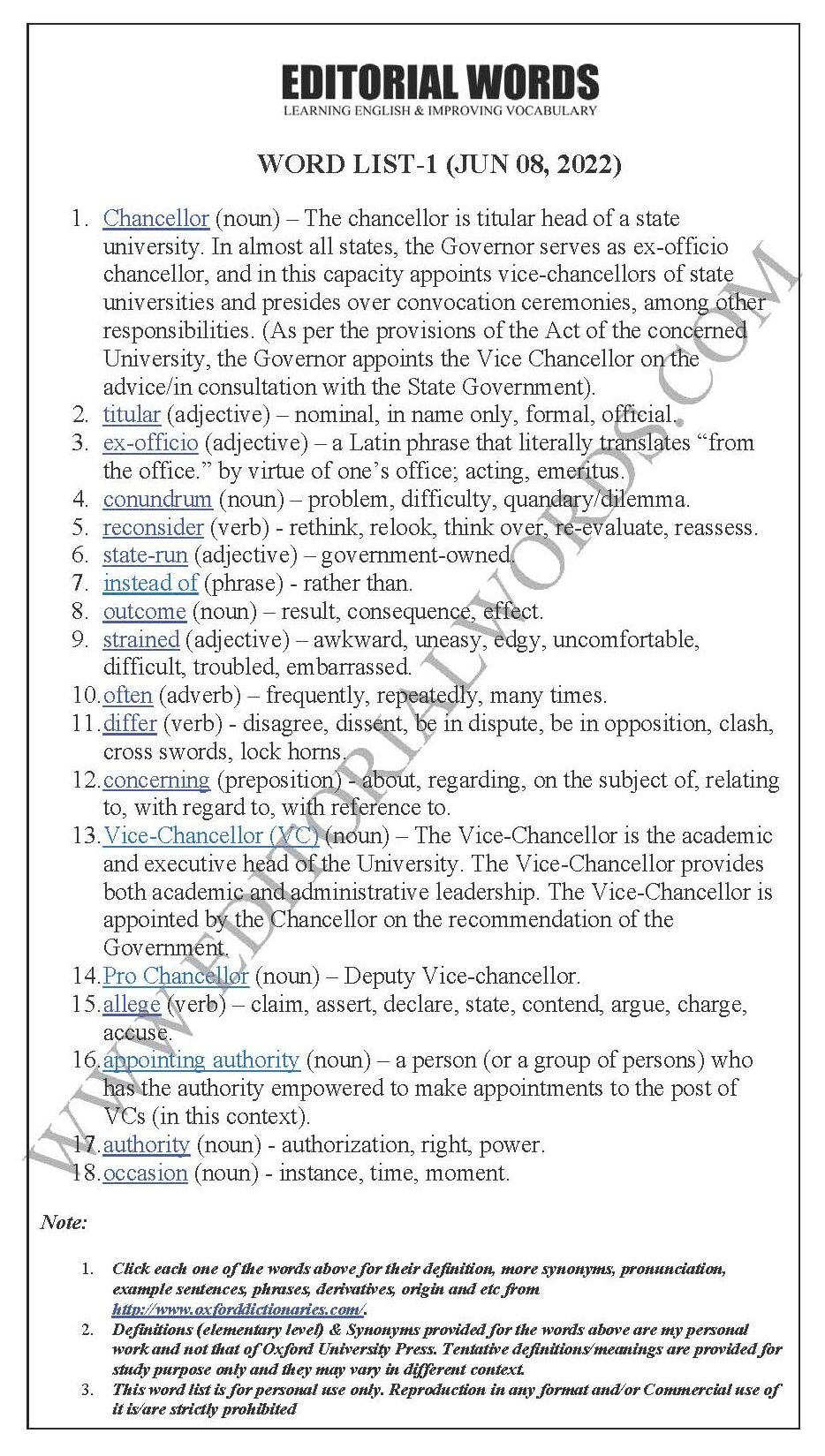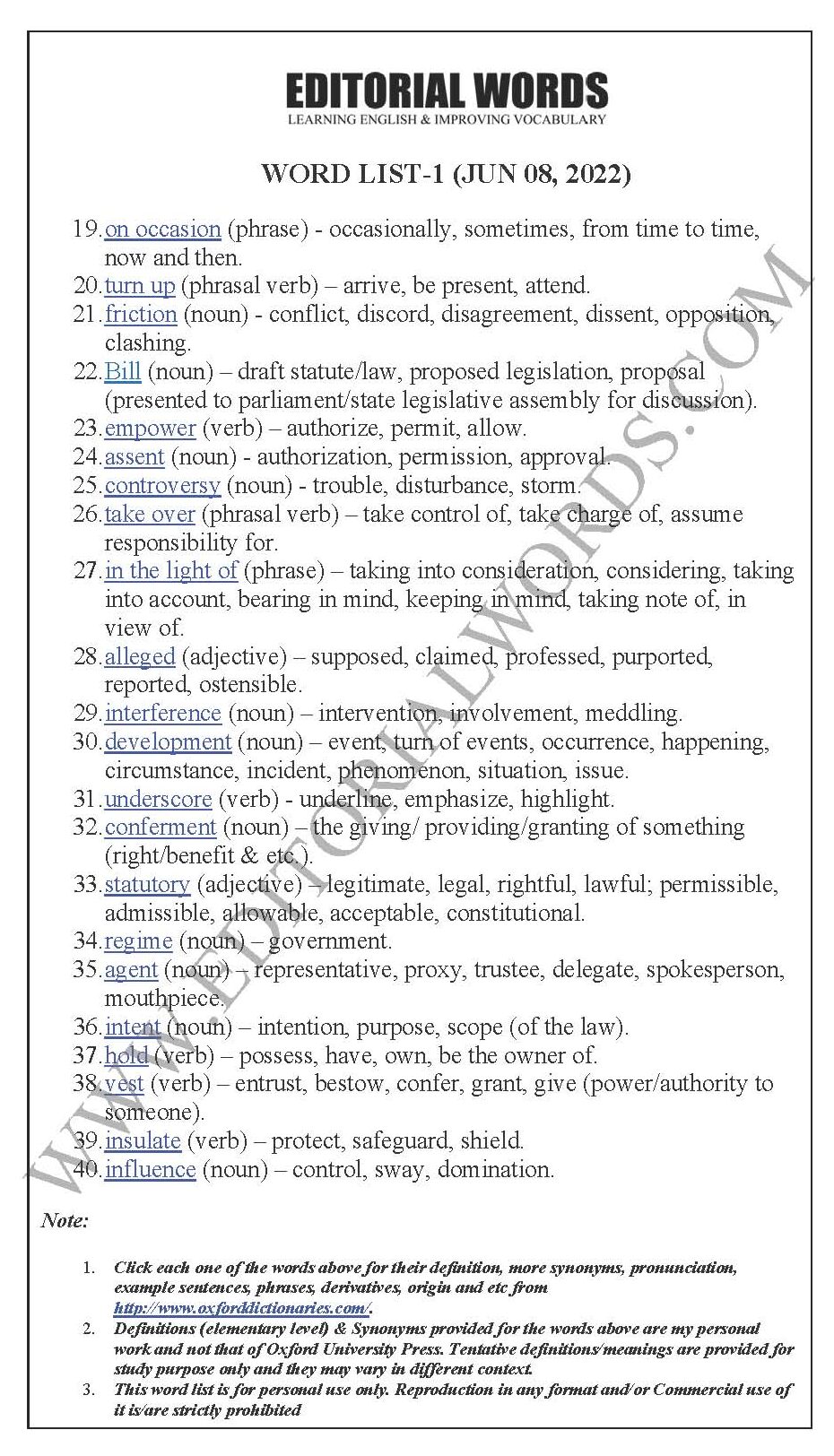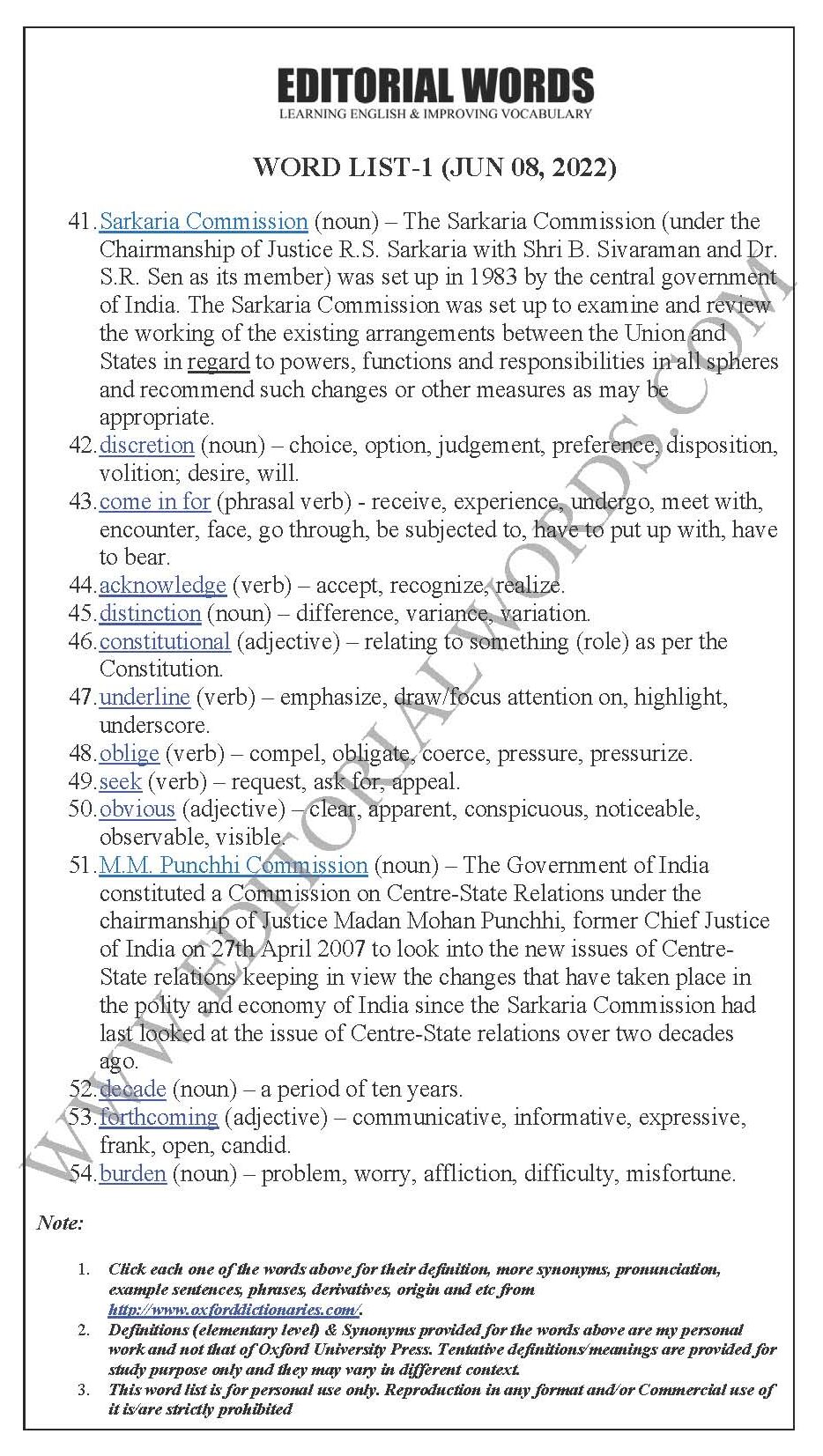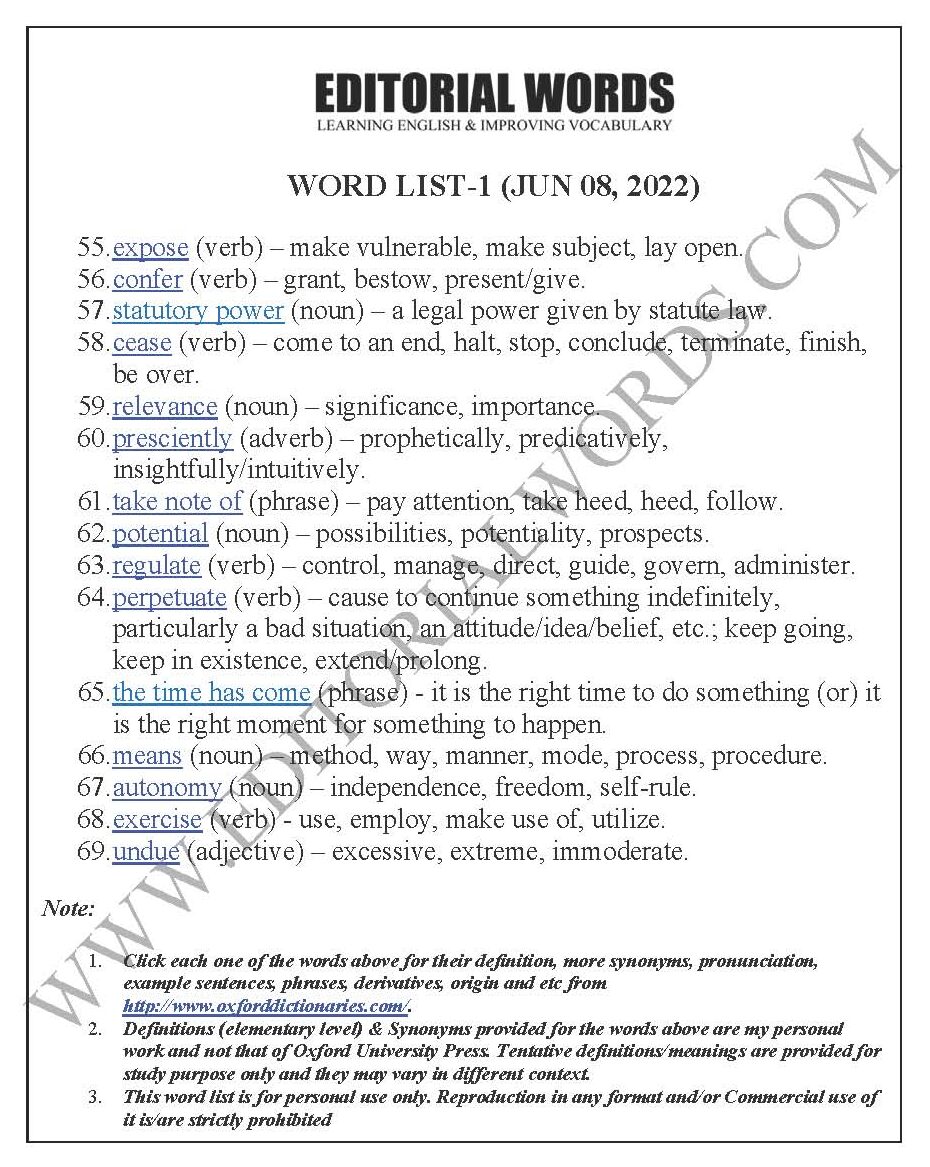The Hindu Editorial (The Chancellor conundrum) – Jun 08, 2022
The West Bengal government’s decision to make the Chief Minister the Chancellor of State-run universities, instead of the Governor,… For further reading, visit “The Hindu”. Below is today’s word list-1 for The Hindu Editorial (The Chancellor conundrum) – Jun 08, 2022.
To read this article, click “The Hindu”.
This preview is provided here with permission.
Courtesy: The Hindu
The Hindu Editorial (The Chancellor conundrum) – Jun 08, 2022:
- Chancellor (noun) – The chancellor is titular head of a state university. In almost all states, the Governor serves as ex-officio chancellor, and in this capacity appoints vice-chancellors of state universities and presides over convocation ceremonies, among other responsibilities. (As per the provisions of the Act of the concerned University, the Governor appoints the Vice Chancellor on the advice/in consultation with the State Government).
- titular (adjective) – nominal, in name only, formal, official.
- ex-officio (adjective) – a Latin phrase that literally translates “from the office.” by virtue of one’s office; acting, emeritus.
- conundrum (noun) – problem, difficulty, quandary/dilemma.
- reconsider (verb) – rethink, relook, think over, re-evaluate, reassess.
- state-run (adjective) – government-owned.
- instead of (phrase) – rather than.
- outcome (noun) – result, consequence, effect.
- strained (adjective) – awkward, uneasy, edgy, uncomfortable, difficult, troubled, embarrassed.
- often (adverb) – frequently, repeatedly, many times.
- differ (verb) – disagree, dissent, be in dispute, be in opposition, clash, cross swords, lock horns.
- concerning (preposition) – about, regarding, on the subject of, relating to, with regard to, with reference to.
- Vice-Chancellor (VC) (noun) – The Vice-Chancellor is the academic and executive head of the University. The Vice-Chancellor provides both academic and administrative leadership. The Vice-Chancellor is appointed by the Chancellor on the recommendation of the Government.
- Pro Chancellor (noun) – Deputy Vice-chancellor.
- allege (verb) – claim, assert, declare, state, contend, argue, charge, accuse.
- appointing authority (noun) – a person (or a group of persons) who has the authority empowered to make appointments to the post of VCs (in this context).
- authority (noun) – authorization, right, power.
- occasion (noun) – instance, time, moment.
- on occasion (phrase) – occasionally, sometimes, from time to time, now and then.
- turn up (phrasal verb) – arrive, be present, attend.
- friction (noun) – conflict, discord, disagreement, dissent, opposition, clashing.
- Bill (noun) – draft statute/law, proposed legislation, proposal (presented to parliament/state legislative assembly for discussion).
- empower (verb) – authorize, permit, allow.
- assent (noun) – authorization, permission, approval.
- controversy (noun) – trouble, disturbance, storm.
- take over (phrasal verb) – take control of, take charge of, assume responsibility for.
- in the light of (phrase) – taking into consideration, considering, taking into account, bearing in mind, keeping in mind, taking note of, in view of.
- alleged (adjective) – supposed, claimed, professed, purported, reported, ostensible.
- interference (noun) – intervention, involvement, meddling.
- development (noun) – event, turn of events, occurrence, happening, circumstance, incident, phenomenon, situation, issue.
- underscore (verb) – underline, emphasize, highlight.
- conferment (noun) – the giving/ providing/granting of something (right/benefit & etc.).
- statutory (adjective) – legitimate, legal, rightful, lawful; permissible, admissible, allowable, acceptable, constitutional.
- regime (noun) – government.
- agent (noun) – representative, proxy, trustee, delegate, spokesperson, mouthpiece.
- intent (noun) – intention, purpose, scope (of the law).
- hold (verb) – possess, have, own, be the owner of.
- vest (verb) – entrust, bestow, confer, grant, give (power/authority to someone).
- insulate (verb) – protect, safeguard, shield.
- influence (noun) – control, sway, domination.
- Sarkaria Commission (noun) – The Sarkaria Commission (under the Chairmanship of Justice R.S. Sarkaria with Shri B. Sivaraman and Dr. S.R. Sen as its member) was set up in 1983 by the central government of India. The Sarkaria Commission was set up to examine and review the working of the existing arrangements between the Union and States in regard to powers, functions and responsibilities in all spheres and recommend such changes or other measures as may be appropriate.
- discretion (noun) – choice, option, judgement, preference, disposition, volition; desire, will.
- come in for (phrasal verb) – receive, experience, undergo, meet with, encounter, face, go through, be subjected to, have to put up with, have to bear.
- acknowledge (verb) – accept, recognize, realize.
- distinction (noun) – difference, variance, variation.
- constitutional (adjective) – relating to something (role) as per the Constitution.
- underline (verb) – emphasize, draw/focus attention on, highlight, underscore.
- oblige (verb) – compel, obligate, coerce, pressure, pressurize.
- seek (verb) – request, ask for, appeal.
- obvious (adjective) – clear, apparent, conspicuous, noticeable, observable, visible.
- M.M. Punchhi Commission (noun) – The Government of India constituted a Commission on Centre-State Relations under the chairmanship of Justice Madan Mohan Punchhi, former Chief Justice of India on 27th April 2007 to look into the new issues of Centre-State relations keeping in view the changes that have taken place in the polity and economy of India since the Sarkaria Commission had last looked at the issue of Centre-State relations over two decades ago.
- decade (noun) – a period of ten years.
- forthcoming (adjective) – communicative, informative, expressive, frank, open, candid.
- burden (noun) – problem, worry, affliction, difficulty, misfortune.
- expose (verb) – make vulnerable, make subject, lay open.
- confer (verb) – grant, bestow, present/give.
- statutory power (noun) – a legal power given by statute law.
- cease (verb) – come to an end, halt, stop, conclude, terminate, finish, be over.
- relevance (noun) – significance, importance.
- presciently (adverb) – prophetically, predicatively, insightfully/intuitively.
- take note of (phrase) – pay attention, take heed, heed, follow.
- potential (noun) – possibilities, potentiality, prospects.
- regulate (verb) – control, manage, direct, guide, govern, administer.
- perpetuate (verb) – cause to continue something indefinitely, particularly a bad situation, an attitude/idea/belief, etc.; keep going, keep in existence, extend/prolong.
- the time has come (phrase) – it is the right time to do something (or) it is the right moment for something to happen.
- means (noun) – method, way, manner, mode, process, procedure.
- autonomy (noun) – independence, freedom, self-rule.
- exercise (verb) – use, employ, make use of, utilize.
- undue (adjective) – excessive, extreme, immoderate.
Note:
1. Click each one of the words above for their definition, more synonyms, pronunciation, example sentences, phrases, derivatives, origin and etc from http://www.oxforddictionaries.com/.
2. Definitions (elementary level) & Synonyms provided for the words above are my personal work and not that of Oxford University Press. Tentative definitions/meanings are provided for study purpose only and they may vary in a different context.
3. This word list is for personal use only. Reproduction in any format and/or Commercial use of it is/are strictly prohibited.
The Hindu Editorial (The Chancellor conundrum) – Jun 08, 2022:




“Phrasal Verbs” We Learnt Last Week
“Idioms & Phrases” We Learnt Last Week
“Important Definitions” We Learnt Last Week
Recent Word Lists For The Hindu Editorial Articles

Be the first to comment